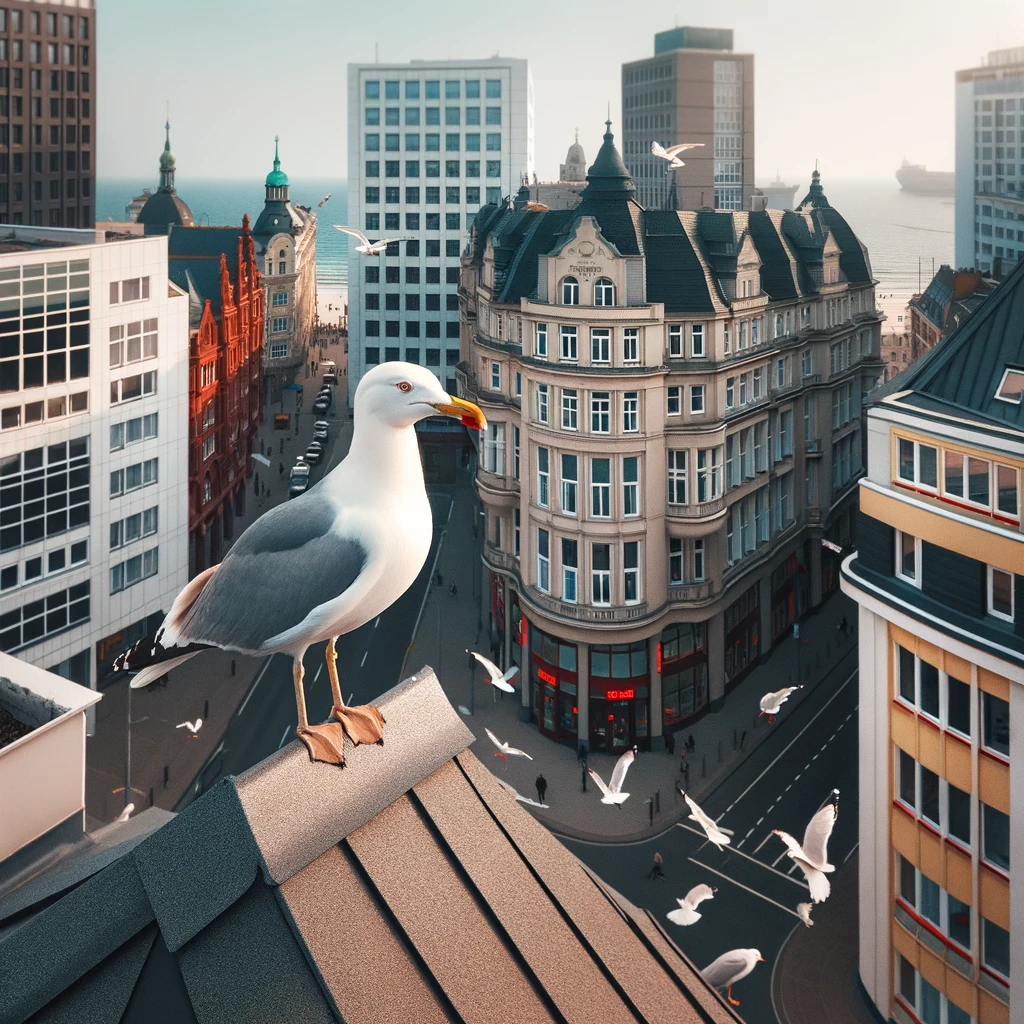Seagulls are moving to cities because they are losing their natural homes. They are having a hard time finding food in the wild because of sickness and not enough fish. So, they look for food in cities, which can cause problems with people. But, experts say we should not be mad at them. Instead, we should find ways to live together, like using better trash cans and not leaving food outside.
Gulls are birds that are not doing well in the wild. In the UK, all six main kinds of gulls are having a hard time and are on special lists that show they need help. People did a big count of gulls in winter to see how many there are and where they stay. This information will help make plans to protect gulls better. Even though fewer gulls are living in natural places, some think more gulls are making homes on buildings, but we’re not sure.
Some people think gulls are annoying, especially when they are trying to protect their babies. But, experts say gulls are interesting animals and we should like having them around. If we understand why gulls act the way they do and help by doing simple things like using good trash cans, we can get along with them in cities. More counting of gulls will happen at the end of the year to help protect them.
Original news source: Seagulls ‘charismatic’ not ‘criminal’, say scientists (BBC)
🎧 Listen:
Slow
Normal
Fast
📖 Vocabulary:
| 1 | Seagulls | Birds that are often found near the sea |
| 2 | Cities | Big places where lots of people live and work |
| 3 | Natural | Coming from nature, not made by people |
| 4 | Sickness | When someone or something is not feeling well |
| 5 | Trash cans | Containers where you throw away things you don’t need |
| 6 | Annoying | Making you feel bothered or irritated |
| 7 | Protect | To keep someone or something safe from harm |
| 8 | Experts | People who know a lot about a certain topic |
| 9 | Count | To find out how many of something there is |
| 10 | Plans | Ideas on how to do something in the future |
| 11 | Interesting | Making you think or pay attention because it’s different or new |
| 12 | Understand | To know or get what someone is saying or feeling |
Group or Classroom Activities
Warm-up Activities:
– Charades
Instructions: Divide the class into two teams. Write down various actions or behaviors that seagulls might do on small pieces of paper (e.g. flying, diving, searching for food, protecting their babies). Have one student from each team come to the front of the class and act out the action on their piece of paper without speaking. The team members must guess what action the student is acting out. The team that guesses correctly gets a point. Repeat with different students and actions.
– News Summary
Instructions: In pairs, have students read the article and take turns summarizing the main points to their partner. Encourage them to use their own words and practice paraphrasing. After they have finished, have them switch partners and summarize the article again. Finally, have a class discussion where students share their summaries and discuss any differences or similarities.
– Opinion Poll
Instructions: Create a list of statements related to the article, such as “Seagulls should be protected in cities” or “Seagulls are annoying and should be removed from cities.” Have students stand up and move to different parts of the room to indicate their level of agreement or disagreement with each statement. Once they have chosen their spot, ask a few students to explain their reasoning. This activity encourages critical thinking and practicing expressing opinions.
– Word Association
Instructions: Write the word “seagulls” on the board. Have students take turns naming words or phrases that they associate with seagulls. Encourage them to think of both positive and negative associations. Write their answers on the board, creating a word cloud. Once the word cloud is complete, ask students to share their thoughts on seagulls based on the associations they see.
– Sketch It
Instructions: In pairs, have one student describe a scene involving seagulls to their partner. The partner must then sketch the scene based on the description. After they have finished, have them switch roles. Once both students have had a chance to describe and sketch, have them compare their drawings and discuss any differences or similarities. This activity helps develop listening skills and encourages creativity.
🤔 Comprehension Questions:
1. Why are seagulls moving to cities?
2. Why are seagulls having a hard time finding food in the wild?
3. What can people do to live together with seagulls in cities?
4. Why are gulls on special lists in the UK?
5. What information did people gather in the winter about gulls?
6. Why do some people find gulls annoying?
7. How can we get along with gulls in cities?
Go to answers ⇩
🎧✍️ Listen and Fill in the Gaps:
Seagulls are moving to cities because they are losing their natural homes. They are having a hard time finding (1)______ in the wild because of sickness and not enough (2)______. So, they look for food in cities, which can cause (3)______ with people. But, experts say we should not be mad at them. Instead, we should find ways to live together, like using (4)______ trash cans and not leaving food outside.
Gulls are birds that are not doing well in the wild. In the UK, all six main kinds of gulls are having a hard time and are on (5)______ lists that show they need help. People did a big (6)______ of gulls in winter to see how many there are and where they stay. This information will help make plans to protect gulls better. Even though fewer gulls are living in natural (7)______, some think (8)______ gulls are making homes on buildings, but we’re not sure.
Some (9)______ think gulls are annoying, especially when they are trying to protect their babies. But, experts say gulls are interesting animals and we should like having them around. If we understand why gulls act the way they do and help by (10)______ simple things like (11)______ good (12)______ cans, we can get along with them in cities. More counting of gulls will happen at the end of the year to help protect them.
Go to answers ⇩
💬 Discussion Questions:
Students can ask a partner these questions, or discuss them as a group.
1. What is a seagull?
2. How do seagulls look for food in cities?
3. Why are seagulls moving to cities?
4. How do seagulls cause problems with people in cities?
5. Do you like having seagulls around? Why or why not?
6. How would you feel if seagulls were always near your house?
7. What can we do to live together with seagulls in cities?
8. Why do seagulls have a hard time finding food in the wild?
9. Do you think we should be mad at seagulls for coming to cities? Why or why not?
10. What are some things we can do to protect seagulls?
11. How do seagulls protect their babies?
12. Have you ever seen a seagull? Where did you see it?
Individual Activities
📖💭 Vocabulary Meanings:
Match each word to its meaning.
Words:
1. Seagulls
2. Cities
3. Natural
4. Sickness
5. Trash cans
6. Annoying
7. Protect
8. Experts
9. Count
10. Plans
11. Interesting
12. Understand
Meanings:
(A) People who know a lot about a certain topic
(B) To keep someone or something safe from harm
(C) When someone or something is not feeling well
(D) To find out how many of something there is
(E) Ideas on how to do something in the future
(F) To know or get what someone is saying or feeling
(G) Making you feel bothered or irritated
(H) Making you think or pay attention because it’s different or new
(I) Containers where you throw away things you don’t need
(J) Coming from nature, not made by people
(K) Big places where lots of people live and work
(L) Birds that are often found near the sea
Go to answers ⇩
🔡 Multiple Choice Questions:
1. Why are seagulls moving to cities?
(a) They prefer the city life
(b) They are losing their natural homes
(c) They are looking for new friends
(d) They want to cause problems with people
2. What is causing seagulls to have a hard time finding food in the wild?
(a) Too many other birds
(b) Lack of interest in hunting
(c) Sickness and not enough fish
(d) The city noise
3. How can people live together with seagulls in cities?
(a) Building more houses for seagulls
(b) Chasing seagulls away with loud noises
(c) Using better trash cans and not leaving food outside
(d) Feeding seagulls with human food
4. Why are gulls on special lists in the UK?
(a) They are having a hard time and need help
(b) They are the most popular birds in the UK
(c) They are causing problems with people
(d) They are the smartest birds in the UK
5. What did people do to help protect gulls better?
(a) They built more buildings for gulls
(b) They chased gulls away from cities
(c) They fed gulls with human food
(d) They counted how many gulls there are and where they stay
6. What do some people think about gulls?
(a) They find them interesting
(b) They want to be friends with them
(c) They want to protect them
(d) They find them annoying
7. How can we get along with gulls in cities?
(a) By understanding why they act the way they do and using good trash cans
(b) By building more buildings for them
(c) By chasing them away from cities
(d) By feeding them with human food
8. What will happen at the end of the year to help protect gulls?
(a) More buildings will be built for gulls
(b) More counting of gulls will happen
(c) Gulls will be chased away from cities
(d) Gulls will be given human food
Go to answers ⇩
🕵️ True or False Questions:
1. Experts say we should be mad at them, but instead find ways to live separately.
2. Gulls in the UK are on special lists that show they need help because they are not doing well in the wild.
3. If we understand why gulls act the way they do and help by doing simple things like using good trash cans, we can get along with them in cities.
4. They are having an easy time finding food in the wild because of sickness and not enough fish.
5. Some people think gulls are endearing, especially when they are trying to protect their babies.
6. This misinformation will hinder plans to protect gulls better.
7. People did a big count of gulls in winter to see how many there are and where they stay.
8. Seagulls are moving to cities because they are losing their natural homes.
Go to answers ⇩
📝 Write a Summary:
Write a summary of this news article in two sentences.
Check your writing now with the best free AI for English writing!
Writing Questions:
Answer the following questions. Write as much as you can for each answer.
Check your answers with our free English writing assistant!
1. Why are seagulls moving to cities?
2. Why are seagulls having a hard time finding food in the wild?
3. What can people do to help seagulls in cities?
4. What did people do to count how many gulls there are?
5. Why do some people find seagulls annoying?
✅ Answers
🤔✅ Comprehension Question Answers:
1. Why are seagulls moving to cities?
Seagulls are moving to cities because they are losing their natural homes.
2. Why are seagulls having a hard time finding food in the wild?
Seagulls are having a hard time finding food in the wild because of sickness and not enough fish.
3. What can people do to live together with seagulls in cities?
People can live together with seagulls in cities by using better trash cans and not leaving food outside.
4. Why are gulls on special lists in the UK?
Gulls are on special lists in the UK because they need help and protection.
5. What information did people gather in the winter about gulls?
People gathered information about how many gulls there are and where they stay in the winter.
6. Why do some people find gulls annoying?
Some people find gulls annoying, especially when they are trying to protect their babies.
7. How can we get along with gulls in cities?
We can get along with gulls in cities by understanding why they act the way they do and by doing simple things like using good trash cans.
Go back to questions ⇧
🎧✍️✅ Listen and Fill in the Gaps Answers:
(1) food
(2) fish
(3) problems
(4) better
(5) special
(6) count
(7) places
(8) more
(9) people
(10) doing
(11) using
(12) trash
Go back to questions ⇧
📖💭✅ Vocabulary Meanings Answers:
1. Seagulls
Answer: (L) Birds that are often found near the sea
2. Cities
Answer: (K) Big places where lots of people live and work
3. Natural
Answer: (J) Coming from nature, not made by people
4. Sickness
Answer: (C) When someone or something is not feeling well
5. Trash cans
Answer: (I) Containers where you throw away things you don’t need
6. Annoying
Answer: (G) Making you feel bothered or irritated
7. Protect
Answer: (B) To keep someone or something safe from harm
8. Experts
Answer: (A) People who know a lot about a certain topic
9. Count
Answer: (D) To find out how many of something there is
10. Plans
Answer: (E) Ideas on how to do something in the future
11. Interesting
Answer: (H) Making you think or pay attention because it’s different or new
12. Understand
Answer: (F) To know or get what someone is saying or feeling
Go back to questions ⇧
🔡✅ Multiple Choice Answers:
1. Why are seagulls moving to cities?
Answer: (b) They are losing their natural homes
2. What is causing seagulls to have a hard time finding food in the wild?
Answer: (c) Sickness and not enough fish
3. How can people live together with seagulls in cities?
Answer: (c) Using better trash cans and not leaving food outside
4. Why are gulls on special lists in the UK?
Answer: (a) They are having a hard time and need help
5. What did people do to help protect gulls better?
Answer: (d) They counted how many gulls there are and where they stay
6. What do some people think about gulls?
Answer: (d) They find them annoying
7. How can we get along with gulls in cities?
Answer: (a) By understanding why they act the way they do and using good trash cans
8. What will happen at the end of the year to help protect gulls?
Answer: (b) More counting of gulls will happen
Go back to questions ⇧
🕵️✅ True or False Answers:
1. Experts say we should be mad at them, but instead find ways to live separately. (Answer: False)
2. Gulls in the UK are on special lists that show they need help because they are not doing well in the wild. (Answer: True)
3. If we understand why gulls act the way they do and help by doing simple things like using good trash cans, we can get along with them in cities. (Answer: True)
4. They are having an easy time finding food in the wild because of sickness and not enough fish. (Answer: False)
5. Some people think gulls are endearing, especially when they are trying to protect their babies. (Answer: False)
6. This misinformation will hinder plans to protect gulls better. (Answer: False)
7. People did a big count of gulls in winter to see how many there are and where they stay. (Answer: True)
8. Seagulls are moving to cities because they are losing their natural homes. (Answer: True)
Go back to questions ⇧















